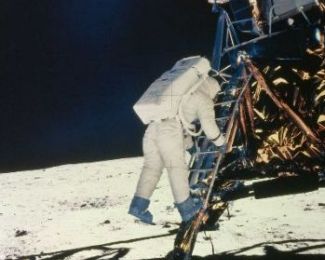'Moon Hoax'

Winged hominids in a sketch from the New York Sun.

Yes, they really did go there!
There are two 'Moon hoaxes.' The first, sometimes referred to as the 'Great Moon Hoax,' was perpetrated in 1835 by Richard Adams Locke, a writer hired by the newly established New York Sun. Having already dabbled in science fiction, it occurred to him to expand his activity in this direction without actually telling anyone. For his subject, he chose the astronomical expedition of John Herschel to the Cape of Good Hope.
Beginning with the 25 August 1835 issue of the Sun, Locke describes in detail all kinds of fantastic discoveries having been made by Herschel with a telescope of such power, he said, that it could see objects on the lunar surface as small as 18 in across. In the second installment, the exotic variety of life supposedly found by Herschel is revealed, including a goatlike animal with a single horn and "an amphibious creature of spherical form, which rolled with great velocity across the pebbly beach." On 29 August, Locke broke the news that lunar intelligence had been found in the guise of 'Vespertilio-homo,' or bat-men. Finally, on 31 August, he spoke of the discovery of yet higher beings and of "the universal state of amity among all classes of lunar creatures..."
Huge interest was created by the articles and, briefly, the Sun became the best-selling newspaper in the world. The New York Times believed the reports both "probable and possible", the New Yorker thought they heralded "a new era in astronomy", Yale was said to be "alive with staunch supporters", while, according to another report, an American clergyman considered starting a collection for Bibles for the lunar inhabitants.1
The fact that the 'Moon Hoax' was almost certainly nothing of the kind has been argued compellingly by Michael Crowe who cites an account of the affair written by William Griggs in 1852. According to Griggs, " ... we have the assurance of the author, in a letter published some years since, in the New World, that it was written expressly to satirize the unwarranted and extravagant anticipations upon this subject..." Yet, the irony is, the hoax failed because the public had been primed for so long by the strident advocates of pluralism to expect intelligent life on other worlds.
The second 'Moon hoax' is the more modern claim that the Apollo missions never landed on the Moon. Sadly, this is born of the same kind of scientific ignorance and naïveté that allowed Locke's tale to take root. It may seem incredible that, in the twenty-firstst century, a considerable number of people in developed nations, notably the USA, could entertain the notion that men have not visited the Moon. This silly scenario was given unnecessary (but, doubtless, commercially successful) support, in February 2001, by a prime-time Fox TV special, "Conspiracy Theory: Did We Land on the Moon?" Amateur theorists were allowed to parade such easily-countered objections as "Why are there no stars in the pictures sent back from the Moon?" (Answer: If the cameras had been adjusted to pick up the stars, the surface would have appeared dazzlingly bright.)
Unfortunately, NASA may have compounded the problem in 2002 by budgeting $15,000 to hire a former rocket scientist, James Oberg, to produce a small book refuting the disbelievers' claims (primarily for the benefit of teachers and students) but then backing away from the project for fear that it would lend credibility to, as NASA Administrator Sean O'Keefe put it, "something that is, on its face, asinine." However, there remains a need, especially in the United States, to counter scientific illiteracy and the growing belief in pseudoscience of all descriptions, including creationism. While attending the Cape Canaveral premiere of the IMAX version of Apollo 13 in November 2002, Tom Hanks said the film industry had a responsibility to promote historical literacy. He took a jab at the 1978 movie Capricorn One, which had NASA's first manned mission to Mars being faked on a sound stage. "We live in a society where there is no law in making money in the promulgation of ignorance or, in some cases, stupidity," he said. Of course, there will always be those who remain unconvinced. But it is important for the future, and for the education of young people who may be easily influenced by nonsensical but sensational claims, that the scientific record is set straight.
Reference
1. Evans, David S. "The Great Moon Hoax," Sky & Telescope, 196 (September 1981) and 308 (Oct ober1981).

